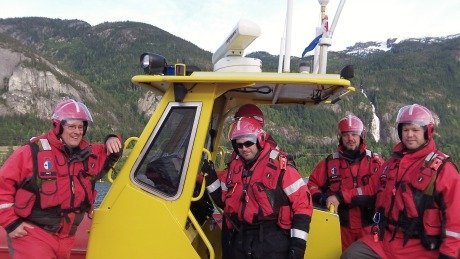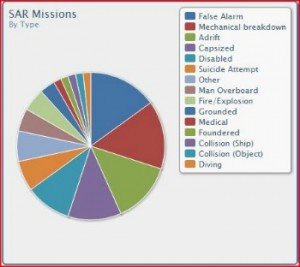
By Gagandeep Ghuman
Published: Sept 6, 2013
The one distress call that Scott Shaw-MacLaren, the station leader for Royal Canadian Marine Search and Rescue (RCM-SAR), remembers the most has nothing to do with boats at all.
“We were called out to help a kite boarder being harassed by seal,” says Scott Shaw-MacLaren.
It turned out to be a false call; the kite boarder had been yelling to get a seal off his way, but someone called to report a kite boarder in danger.

Photo: Submitted
The kite boarder was safe, but everyday marine search and rescue volunteers are prepared to help those with their boats adrift, disabled and capsized.
Recently, their rescue effort involved getting help for someone trying to put their life out on the water.
While 2013 is shaping up to be one of the busiest years for ground search and rescue, their friends on the water have been no less busy.
Till date, marine volunteers have attended to 17 rescue missions. Last year, they responded to only 4 such calls.
In total, RCM-SAR has responded to 59 rescue missions ever since they started the Squamish Station in 2008.
The volunteers will respond to any call that is north of Anvil Island.
Squamish Harbour is by far the busiest area for calls, but Porteau Cove also sees some action, according to Shaw-MacLaren.
Not a lot of people are aware that Royal Canadian Marine Search and Rescue is, in fact, a volunteer run organization.
Known formerly the Coast Guard Auxiliary, the Royal Canadian Marine Search and Rescue (RCM-SAR) volunteers are spread throughout 46 stations in B.C.
In the last one year, they responded to 716 missions in the province. In Squamish, there are around 21 local brave hearts who volunteered for rescue missions.
The funding for the rescue vessels as well as the crews’ equipment and safety gear is provided to a large degree by B.C. Gaming, but also through corporate sponsorships, private donations, and fundraising.
Their companions on the ground have been no less busy.
As of July 30, Squamish SAR had responded to 55 calls for assistance this year, making Squamish the busiest SAR group in the province at this time.
“Our team members have been challenged in 2013 like never before,” said John Howe, president of Squamish Search and Rescue.
“Most of our calls are in response to medical emergencies in remote settings, often in technical terrain.”

